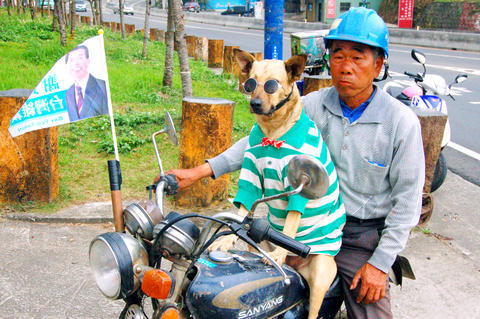To vote for the Chinese Nationalist Party (KMT) in Saturday's presidential election would be to endorse one-party rule, Democratic Progressive Party (DPP) presidential candidate Frank Hsieh (
"One-party rule is bound to have far-reaching repercussions on the development of democracy and people's livelihoods," Hsieh said.
Since the KMT won the legislative election in January, many have wondered whether the country's hard-earned democracy is doomed, he said.

PHOTO: TUNG CHEN-KUO, TAIPEI TIMES
Hsieh made the remarks after visiting Huang Kun-yen (
Urging undecided voters to come out and vote, Huang said he was worried the KMT's control of both the legislature and the executive would corrupt the party, whose lust for power manifested itself during its 50-year authoritarian rule.
"Power corrupts," he said. "Compared with the KMT's half-a-century rule, eight years of DPP rule is too short. We need another party to act as a check on the KMT's power."
If the KMT establishes the "cross-strait common market" and recognizes Chinese academic credentials, Huang said he expected medical quality to deteriorate, as there are as many as 5,000 medical practitioners in China waiting to enter the Taiwanese market.
While the KMT promised not to abuse its power if elected, Hsieh said the public could not afford to count on the party's goodwill alone.
"What if it [the KMT] cannot deliver on its promises? The only thing people could do is cry," he said. "We must establish a system in which the government continues to operate, but with checks and balances -- no matter who is in power."
If elected, Hsieh said, he promised to share administrative powers with the KMT and appoint a KMT member as premier.
The country would not be in idle spin, there would no longer be political infighting and government budgets would not be boycotted, Hsieh said. He would act as the gatekeeper of cross-strait policy and ensure that Taiwan-centered consciousness, national security and sovereignty are upheld while opening up to China.
At a separate setting yesterday, former national policy adviser to the president Huang Tien-fu (黃天福) expressed similar concerns, saying that Beijing's bloody crackdown on Tibet reminded him of the KMT's authoritarian rule.
"I'm afraid that Taiwan will become the next Tibet," he said. "If the KMT wins the election, we don't know when we will [get the presidency] back."
Huang Tien-fu is the brother of former DPP chairman Huang Hsin-chieh (黃信介), one of the individuals accused during the Kaohsiung Incident.
Also known as the Formosa Incident, the Kaohsiung Incident occurred on Dec. 10, 1979, when the KMT government cracked down and imprisoned participants in an anti-government parade organized by Formosa magazine.

US President Donald Trump said "it’s up to" Chinese President Xi Jinping (習近平) what China does on Taiwan, but that he would be "very unhappy" with a change in the "status quo," the New York Times said in an interview published yesterday. Xi "considers it to be a part of China, and that’s up to him what he’s going to be doing," Trump told the newspaper on Wednesday. "But I’ve expressed to him that I would be very unhappy if he did that, and I don’t think he’ll do that," he added. "I hope he doesn’t do that." Trump made the comments in

Tourism in Kenting fell to a historic low for the second consecutive year last year, impacting hotels and other local businesses that rely on a steady stream of domestic tourists, the latest data showed. A total of 2.139 million tourists visited Kenting last year, down slightly from 2.14 million in 2024, the data showed. The number of tourists who visited the national park on the Hengchun Peninsula peaked in 2015 at 8.37 million people. That number has been below 2.2 million for two years, although there was a spike in October last year due to multiple long weekends. The occupancy rate for hotels

Japanese footwear brand Onitsuka Tiger today issued a public apology and said it has suspended an employee amid allegations that the staff member discriminated against a Vietnamese customer at its Taipei 101 store. Posting on the social media platform Threads yesterday, a user said that an employee at the store said that “those shoes are very expensive” when her friend, who is a migrant worker from Vietnam, asked for assistance. The employee then ignored her until she asked again, to which she replied: "We don't have a size 37." The post had amassed nearly 26,000 likes and 916 comments as of this

A cold surge advisory was today issued for 18 cities and counties across Taiwan, with temperatures of below 10°C forecast during the day and into tonight, the Central Weather Administration (CWA) said. New Taipei City, Taipei, Taoyuan and Hsinchu, Miaoli and Yilan counties are expected to experience sustained temperatures of 10°C or lower, the CWA said. Temperatures are likely to temporarily drop below 10°C in most other areas, except Taitung, Pingtung, Penghu and Lienchiang (Matsu) counties, CWA data showed. The cold weather is being caused by a strong continental cold air mass, combined with radiative cooling, a process in which heat escapes from